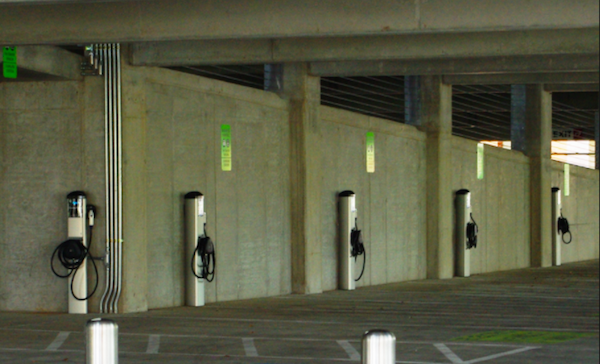
West Hollywood is taking steps to make the city more compatible for electric vehicles, with a new requirement that new commercial and multifamily residential buildings accommodate electric charging stations.
The City Council voted Monday to require that new buildings have in place an infrastructure that will allow installation of electric charging stations. Owners of existing commercial and multifamily residential buildings won’t be required to take such steps, but if they add electric vehicle charging stations to existing parking spaces those spaces will still count toward parking requirements under the current zoning ordinance.
New residential buildings will have to provide a minimum of one electric vehicle “ready” station, with that increasing to two stations for buildings with two to 20 units. Buildings with 20 or more units will have to provide stations equal to 10% of the total parking spaces. Residential buildings with 11 to 15 units will have to provide at least one electric vehicle “capable” space. Those with 16 to 20 units will have to provide two spaces, and those with 20 or more units will have to make 90% of parking spaces electric vehicle capable.
Electric vehicle capable stations are those that don’t have a charging station installed but do have the conduits necessary to carry electrical wiring to future charging stations. Those that are “ready” already have electrical circuits installed. Nonresidential buildings will face the same requirements.
The city is not amending state requirements for single-family homes, duplexes and townhouses with attached private garages, which are required to be electric vehicle capable.”
The state’s CalGreen law already requires that new multi-family residential buildings with 17 or more units make 3% of parking spaces “capable” and have such space in a common space of the parking area. Nonresidential buildings with 10 to 25 spaces have to ensure that one of those is electric vehicle capable. The requirement is two electric vehicle capable spaces for buildings with 26 to 50 spaces, four for 51 to 75 spaces, five for 76 to 100 spaces, seven for 101 to 150 spaces and 12 for 151 to 200 spaces. Buildings with 201 spaces or more must make 6% of them electric vehicle capable.
A memo from the city’s Community Development Department says that supporting the use of electrically charged vehicles is important in reducing air pollution.
“Those traveling long distances for work or recreation need local charging options in order to feel comfortable relying on electric vehicles,” it says. “The awareness and assurance of EV chargers along everyday travel routes and at destination points are critical decision factors when purchasing an electric vehicle. Furthermore, the large majority of EV drivers desire to charge their cars at home, which can be a challenge for those living in multifamily buildings due to the lack of existing infrastructure and the high cost of retrofitting parking spaces with EV charging infrastructure.”
Councilmember John D’Amico, an avid proponent of electric vehicle charging stations, noted that there currently are 376,000 electric vehicles and 21,943 charging stations in California. He noted that the city has stated a goal of having a charger within one-eighth of a mile of every resident.”
City Hall considered requiring electric vehicle charging capability in buildings with three or more units, but the Community Development Department memo said it recognizes the difficulty of meeting that requirement in a small building which must make charging spaces compliant with the Americans with Disabilities Act.
CalGreen requires that the first EV charging station “be installed in a van accessible-sized space with an access aisle,” its memo states. “As more EV charging stations are installed, this van accessible space must convert to a dedicated accessible EV charging station, with a certain number of subsequent EV charging stations designed to meet standard accessible space specifications.” In other words, installing one electric vehicle charging station may require the use of two parking spaces.
Councilmember D’Amico agreed with City Hall’s rationale for requiring electric vehicle capable and ready spaces rather than the actual installation of them by the building owner. “If you install a charger, and you’re the owner of the building, you’d be paying for the electric ‘gasoline’ of the vehicle, and it wouldn’t be part of the rent,” he said. D’Amico said installation of an actual charger by an electrician could cost $400. “It does seem like it’s unfair to require landlords and owners to have to pay for people to charge their vehicles.”

This is great and forward thinking.
We should also regulate the dimensions of a parking space. Builders put in compact spaces to get the counts up and no cars fit in them. When people can’t fit they park over the line and the adjacent space becomes unusable. You end up with 2 cars in 3 spaces. Close this parking count loophole!
This is excellent news. Kudos to City Council and John D’Amico for being proactive about this issue. My Partner and I bought a Chevy Volt 3 months ago and still have the full tank of gas the Dealer gave us. We have not spent any money on gasoline. My building (The Avalon) has charging parking spaces. They charge $54. a month for unlimited electricity in addition to rent. I think that is very reasonable. I am all in favor of alternative energy and easy access to it.